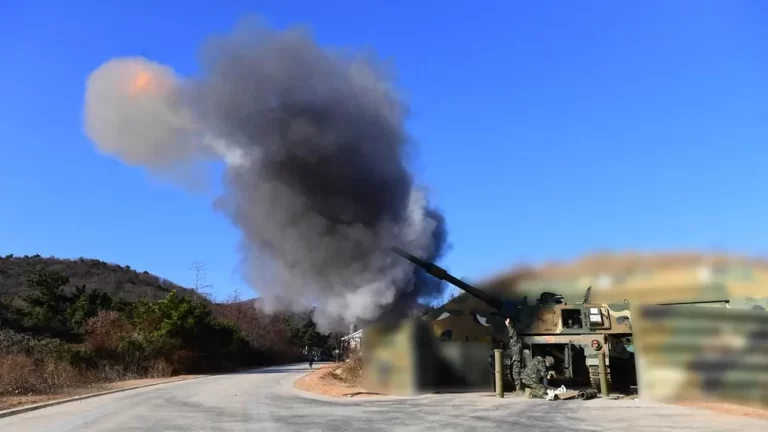North Korea has fired more than 200 rounds of artillery shells off its west coast, towards the South's Yeonpyeong island, Seoul's military has said.
South Korea ordered civilians to seek shelter on the island before holding live fire drills of its own.
The South has condemned the move, calling it a “provocative act”.
In 2010, North Korean artillery fired scores of times on Yeonpyeong island, killing four people.
The artillery shells fired on Friday, between 09:00 to 11:00 local time (00:00 to 02:00 GMT) did not enter South Korean territory as they all landed in the buffer zone between the two countries.
South Korea's Joint Chiefs of Staff said the incident caused “no damage to our people or military”, but added that the act “threatens peace on the Korean peninsula and raises tensions”.
The shelling follows warnings from Pyongyang that it was building up its military arsenal in preparation for war that could “break out at any time” on the peninsular.
Authorities on two nearby islands, Baengnyeong and Daecheong, also told civilians to seek shelter.
“North Korea resuming its artillery fire drills inside the non-hostility zone this morning is an act of provocation which threatens peace on the Korean Peninsula and raises tension,” South Korea's Defence Minister Shin Won-sik said in a statement on Friday.
“Our military must assume the readiness to completely wipe out the enemy so that they wouldn't dare another provocation, and to back up the pace through strength,” he said.
His ministry said it did not observe any movements from the North during South Korea's drills.
The latest incident comes months after North Korea fully suspended a military deal with the South that had been aimed at improving relations.
The deal started to sour after Pyongyang claimed to have successfully launched a spy satellite into space in November. This led to South Korea partly suspending the agreement, saying it would resume surveillance flights along the border.
Afterwards, Pyongyang said it would withdraw all measures “taken to prevent military conflict in all spheres including ground, sea and air”, and deploy “more powerful armed forces and new-type military hardware” in the border region.
But North Korea had violated the pact multiple times in the two years before, launching missiles and firing artillery rounds into the sea in the South's direction. The last time North Korea fired artillery shells into the sea was in December 2022, with nine such incidents happening in that year alone.
Some analysts therefore argue that Pyongyang officially withdrawing from the deal might not make much of a difference.
“Because North Korea was not adhering to the agreement in the first place, the possibility of limited collision has always been there”, said Jo Bee Yun of the Korea Institute for Defence Analysis.
Yeonpyeong island, home to a military base and a small civilian population of about 2,000 people, lies 3km (2 miles) from the disputed maritime border in the Yellow Sea and 12km from the North Korean coast.
It has been the scene of inter-Korean naval clashes over the years.
In 2010 – two soldiers and two civilians were killed after North Korea fired dozens of artillery shells towards the island.
— CutC by bbc.com


